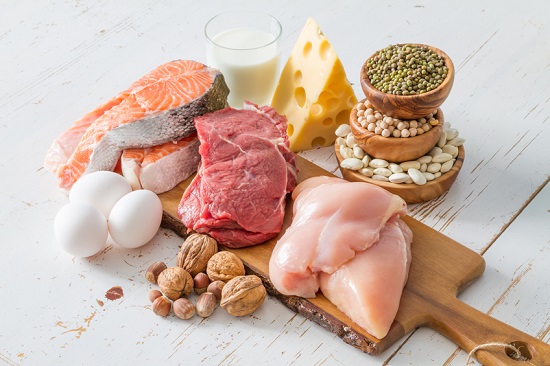I am so glad you asked that question! Of course, we all know that protein is very important for good health. However, there are a number of opinions as to how much we need for optimal function.
The Dietary Reference Intake (DRI) is 0.36 grams per pound. This averages out to be 46 grams a day for the average woman and 56 grams a day for the average man.
While this small amount is enough to prevent deficiency, studies show that it is not sufficient to ensure optimal health.
As it turns out, the proper amount of protein for an individual depends on factors such as age, muscle mass, current state of health, and activity level.
How Much Protein I Recommend Daily For My Patients
For my patients who lead busy lives, do mild exercise such as walking for 20-30 minutes 2-3 times a week, and maintain a healthy weight, I recommend 0.36 to 0.6 grams of protein for each pound of body weight. This averages out to be 56-91 grams per day for the average male and 46-75 grams per day for the average female. I recommend staying on the higher side—about 90 grams for men and 75 grams for women. You’ll need to divide this over 3-4 meals a day for optimal results, as our body needs its protein stores to be constantly replenished.
What If I Want To Gain Muscle Mass And Strength?
Many studies have been done to find the optimal amount of protein for muscle gain, and many of these studies have reached different conclusions. Study results are often conflicting, but here is what I have found works best for my patients who are trying to gain muscle mass and strength for both women and men: 0.7-1 gram of protein for each pound of body weight. As an example, a 150 pound person would have a recommended target of about 100-150 grams of protein a day.
Keep in mind that if you are carrying a great deal of body fat, then it is better to use your lean mass or your goal weight, rather than total body weight, as it is your lean mass that determines your protein need.

What Proteins And Amino Acids Do For A Living!
Proteins are organic molecules made up of amino acids, known as the building blocks of life. Amino acids are joined together by chemical bonds and then folded into unique patterns to create proteins.
There are two main categories of amino acids in the body. First, essential amino acids. The body cannot produce these, so it is essential that we obtain them through diet.
Second, we have nonessential amino acids. These the body can make for itself.
There is a third category known as conditionally essential amino acids. This means that our body cannot always make as much as we need, especially when we are under stress.
Essential Amino Acids
- Histadine
- Isoleucine
- Leucine
- Lysine
- Methionine
- Phenylalanine
- Threonine
- Tryptophan
- Valine
Nonessential Amino Acids
- Alanine
- Asparagine
- Aspartic Acid
- Glutamic Acid
- Proline
- Serine
Conditionally Essential Amino Acids
- Arginine
- Cysteine
- Glutamine
- Glycine
- Tyrosine
During digestion, our body breaks down proteins into individual amino acids, where they become part of the plasma pool of amino acids. This pool is a storage reserve of amino acids that circulate in the blood.
The amino acid pool trades with the amino acids and proteins in our cells, provides a supply of amino acids as needed, and is continuously replenished. (Think of it as a bank account, with constant deposits and withdrawals.)
Our body needs proteins and amino acids to produce important molecules in our body, including hormones, neurotransmitters, antibodies, and enzymes. So, without an adequate protein intake our bodies do not function well as all.
Protein also helps replace worn out cells, transports various substances throughout our body, and aids in growth and repair.
I am often asked about eating too much protein, as some have reported a possible link between a high protein diet and kidney disease and osteoporosis. None of this is supported by science.
Although protein restriction is helpful for those with pre-existing kidney problems, protein has never been shown to cause kidney damage in healthy people.
Interestingly, a diet higher in protein has been shown to lower blood pressure and help fight diabetes, both of which are two of the main risk factors for kidney disease.
Remember, also, that when referring to “grams of protein” I am referring to the protein portion of a given food, not the actual weight of the food.
For example, an 8 ounce serving of beef weighs 226 grams, but contains 61 grams of actual protein. A large egg weighs about 46 grams, but it contains 6 grams of protein. So, as always, be sure to read those labels!
One More Thing To Remember……..
- Complete proteins: Proteins from animal sources such as meat, eggs and dairy are complete proteins since they have all the 9 essential amino acids in a correct balance.
- Incomplete Proteins: Vegetable proteins are called incomplete proteins because they lack one or more amino acids. So, grains, cereals and nuts can be eaten combined with beans, peas, lentils, peanuts, and peanut butter to make a complete protein diet. Soy and quinoa contain all nine essential amino acids and are considered complete proteins.
It is not necessary to include all the essential amino acids in every meal. If we eat a variety of proteins throughout the day, our body will absorb what it needs.









If I need to get at least 75 grams of protein per day divided into 4-5 meals. How do I know how many grams per meal depending on what i eat? do you know where i can find a protein chart with food list or something like to give me an idea of how many gram of small piece of chicken?
i am glad I continue learning so much from your articles.
Hi Sandy,
There are a number of good charts on the internet. I often recommend Googling “how many grams of protein in …….”
Just fill in the blank with the food and amount you have in question, such as 4 ounces of chicken breast.
Hope this helps!
Dr. Maxwell